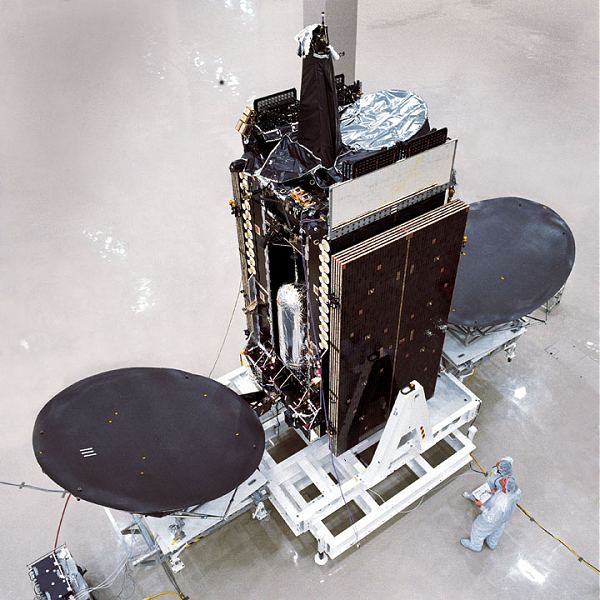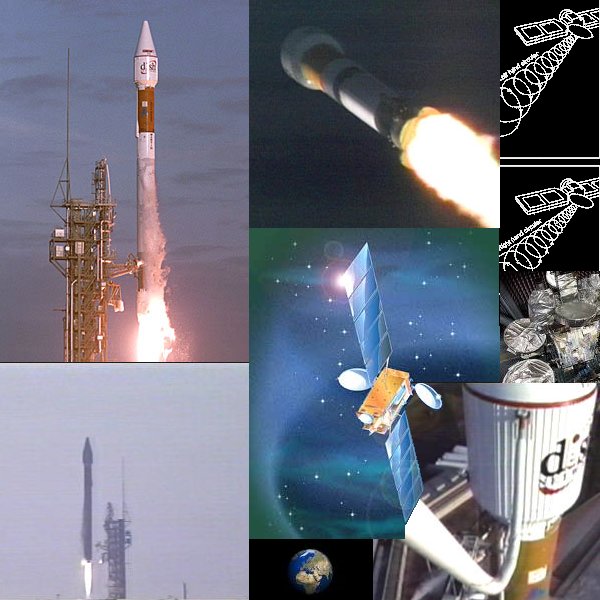EchoStar 7 by Lockheed Martin: Difference between revisions
mNo edit summary |
|||
| (One intermediate revision by the same user not shown) | |||
| Line 13: | Line 13: | ||
Dish Network is the primary Digital Ku-band Provider using Echostar 7. There are two channels that are "in the clear" or FTA available on Echostar 7, they are: Angel One, and the NASA channel. | Dish Network is the primary Digital Ku-band Provider using Echostar 7. There are two channels that are "in the clear" or FTA available on Echostar 7, they are: Angel One, and the NASA channel. | ||
== Launch and Placement == | |||
EchoStar 7 was placed into a highly elliptical geosynchronous transfer orbit of approximately 57,372 km at the high point and 186 km on the low end with an inclination of 22.88 degrees to the equator. The satellite will fire its onboard engine in a series of maneuvers to achieve a circular orbit of 36,000 km and reduce inclination, arriving in geostationary orbit where the craft will match Earth's rotation to appear parked above one spot of the globe -- 119 degrees West longitude over the equator. | |||
From that vantage point, EchoStar 7 will replace the EchoStar 4 spacecraft that has suffered technical problems affecting its ability to relay programming to the subscribers of the direct-to-home satellite TV service called DISH Network. EchoStar has over 6 million subscribers across the U.S. | |||
In addition, EchoStar 7, built by Lockheed Martin, will beam local TV channels to Alaska and Hawaii, allowing DISH Network subscribers there to watch their local ABC, CBS and NBC affiliates and other stations. | |||
== It's a Big Satellite == | |||
[[Image:EchoStar7_001.jpg]] | |||
== Launched into Space == | |||
[[Image:EchoStar7_002.jpg]] | |||
<big>Echostar-VII was launch using a Lockheed Atlas III (AC-204) from Cape Canaveral Air Force Base in Florida from Launch Complex 36-B. The launch took place Thursday, February 21, 2002 and was originally scheduled for 7:13 EST (12:13 GMT) but was moved to 7:43 AM EST. The launch window was 31 minutes. </big> | |||
| | ||
Latest revision as of 17:29, 28 March 2008
Echostar 7 carries 32 Ku-band transponders capable of operating at 120 watts per channel, which are switchable to 16 transponders capable of operating at 240 watts per channel. The 4027 kg (8876 lbm) direct broadcast satellite was built by Lockheed Martin using the A2100AX spacecraft bus. Five transponder frequencies may also be used in a spot beam mode for a potential total of 15 spot beams.
The EchoStar 7 telecommunications satellite was launched from the United States Feb. 21, 2002 using an Atlas IIIB rocket. It is a direct-broadcast satellite in geosynchronous transfer orbit.
ECHOSTAR 7 can be found in the following categories:
- NORAD ID: 27378
- Int'l Code: 2002-006A
- Perigee: 35780 km
- Apogee: 35794 km
- Inclination: 0.1°
- Period: 1436.1 min
- Reception Areas: CONUS, Hawaii, Alaska and Puerto Rico; 32 Ku-band transponders
Dish Network is the primary Digital Ku-band Provider using Echostar 7. There are two channels that are "in the clear" or FTA available on Echostar 7, they are: Angel One, and the NASA channel.
Launch and Placement
EchoStar 7 was placed into a highly elliptical geosynchronous transfer orbit of approximately 57,372 km at the high point and 186 km on the low end with an inclination of 22.88 degrees to the equator. The satellite will fire its onboard engine in a series of maneuvers to achieve a circular orbit of 36,000 km and reduce inclination, arriving in geostationary orbit where the craft will match Earth's rotation to appear parked above one spot of the globe -- 119 degrees West longitude over the equator.
From that vantage point, EchoStar 7 will replace the EchoStar 4 spacecraft that has suffered technical problems affecting its ability to relay programming to the subscribers of the direct-to-home satellite TV service called DISH Network. EchoStar has over 6 million subscribers across the U.S.
In addition, EchoStar 7, built by Lockheed Martin, will beam local TV channels to Alaska and Hawaii, allowing DISH Network subscribers there to watch their local ABC, CBS and NBC affiliates and other stations.
It's a Big Satellite
Launched into Space
Echostar-VII was launch using a Lockheed Atlas III (AC-204) from Cape Canaveral Air Force Base in Florida from Launch Complex 36-B. The launch took place Thursday, February 21, 2002 and was originally scheduled for 7:13 EST (12:13 GMT) but was moved to 7:43 AM EST. The launch window was 31 minutes.

